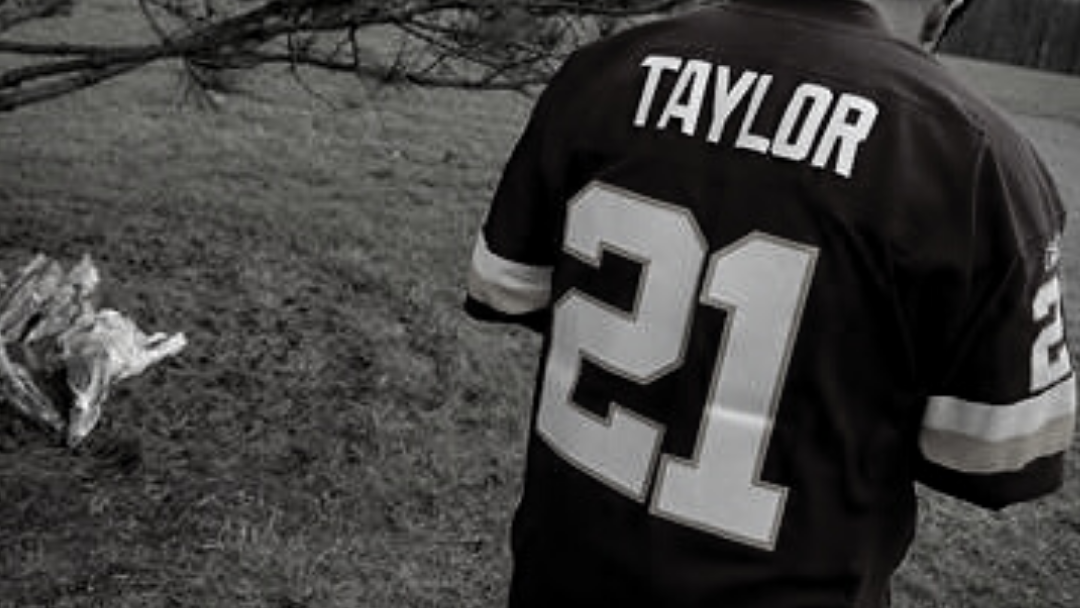CLICK CLACK.
This is the first thing Jamil hears when he wipes the sleep from his eyes. He has no sheets or pajamas, so he wakes up with his skin stuck to the air mattress. He peels himself off of the blue plastic, stands naked except for his boxer shorts, hugs his arms around his body for warmth, shivers. The mother must have forgotten to pay the PG&E bill again.
Click clack.
Click clack.
The sounds are coming from the kitchen. Jamil hears the freezer door open. He wanders into the kitchen, still rubbing sleep from his eyes. There is a man standing in the kitchen, the freezer door ajar. A man he has never seen before. He is tall and dark skinned, like Jamil’s daddy. Jamil watches as the man removes a neon orange, translucent, plastic pill bottle from the freezer. It’s the kind with the childproof top that Jamil doesn’t believe is childproof at all.
“The key is that you gotta freeze it first, boy,” the man says, never once looking at Jamil. “Get it cold and hard so it break up nicely.”
Jamil watches the man take a can of Clabber Girl out of the kitchen cabinet. He opens the container, dips a straw in it, uses the straw to scoop up some of the white powder, drops the stuff in the medicine bottle.
“It’s gonna eat the cut,” the man continues. “That’s what it do. Ya gotta keep putting more cut in. Keep shaking it, keep clacking it. Stupid motherfuckers use quarters and dimes, not thinkin’ bout how them coins got ridges. See the ridges, boy?”
The man holds his hand out to Jamil, finally looking at him, the whites of his eyes gone yellow with sickness. In his hand is a quarter. “You see ‘em?”
Jamil nods.
“You gotta use nickels. Flat edges. Won’t lose none of the good shit that way. That’s why you don’t use quarters. All that yeah finna get stuck in the ridges. What a waste.”
The man drops a few nickels in the medicine bottle and starts shaking it like a tambourine.
Click clack.
Jamil knows this sound from a distant memory. The image is a fading watercolor, the lines and hues all running together. But the sound, the sound he remembers.
Click clack.
“My daddy used to make those sounds,” Jamil says to no one.
“I know your bitch ass daddy,” the man grumbles, slurring his words.
When the man has exhausted himself with all the clacking, he opens up the bottle and pours a golden, powdery substance into the cap. He puts the straw to his nose, puts the other end of the straw into the stuff that looks like sand. The man snorts loudly and jerks upright, standing at attention. His eyes roll back in his skull, the whites glistening like wet boiled eggs.
“That’s the one.”
Jamil walks past the man and opens the fridge. He looks inside for something to eat, finds nothing. The hunger pains are a knotted pair of snakes, writhing inside of his stomach, uncoiling, gnawing at his insides. He knows that if an adult can get him to school today he will be on the free lunch list, and he knows today is a Tuesday and Tuesdays are always nuggets and tater tots. Occasionally some of his kinder classmates will give him their own tater tots and Jamil will keep them hidden away, safe in the front pocket of his hooded sweatshirt, to bring home for later.
Jamil walks back to the living room, passing the door to the mother’s bedroom and the sickly sweet smell that comes from it, passing the man who has now fallen asleep standing up. He snores loudly, his chin in his chest and drool falling from the corners of his mouth. Jamil thinks about tater tots and hungry snakes and killing the man in the kitchen. He doesn’t know how he would do it, he hasn’t gotten that far yet. He just knows that it wouldn’t be impossible. Yes, Jamil knows he is a child, knows his limitations and knows that the man is much bigger than him. But the man has fallen asleep standing up. Jamil doesn’t think that a man who falls asleep standing up would be too much of a challenge, even for a fourth grader.
Jamel thinks about Sean Taylor, the best free safety of all time. Sean Taylor was awesome. Sean Taylor got himself killed by a bullet in the leg, which at first, didn’t make much sense to Jamil. Nobody dies from getting shot in the leg, and certainly not a big, strong football player like Sean Taylor. This was back before Jamil learned about the femoral artery. The janitor, Mr. Demetrius, broke it down for him in a way that he could understand. Jamil appreciated the way that Mr. Demetrius talked to him, like he was a person, and how he listened to him when he talked and never tried to make him sit on his lap like the doctor at the Thomas B. Finan Center did.
“It’s the femoral artery,” Mr. Demetrius had said, an unlit Black and Mild perfectly positioned in the corner of his mouth, hanging at the edge of his lips as if suspended by magic. “You got one in each thigh. Gets the blood to your legs. Cut one of those joints, stab em, poke em, get shot in the shit like poor Sean Taylor, you finna bleed out. That’s it for you. Less you live next door to a trauma center or some shit. Sean Taylor. God bless him. Rest in power, young brother.”
Everybody was wearing Sean Taylor jerseys at school that day. Everyone except Jamil who wore the same, soiled, Old Navy sweatshirt every day.
Jamil is back in the kitchen, watching the man who looks like his daddy sleep standing up. He takes a step closer, extends his hand and tentatively pokes the man in the hip. The man sways but remains unconscious. Jamil realizes that he has not heard the sounds of the mother waking up yet. This is not unusual. Sometimes the mother doesn’t come out of the room for days. But something feels different to Jamil. Something here is unfamiliar. Taboo. The silence that comes from her bedroom door is deafening. Equal parts fear and equal parts excitement churn inside of him like a volatile chemical reaction.
Jamil looks at the wooden knife block on the counter, an artifact from a time when the mother could afford such indulgences. A bread knife sticks out of the wood block, halfway in, the sunlight coming in through the window reflecting off of the blade. If I stab him in the femoral artery, will he bleed out before he wakes up? Jamil wonders. This man isn’t anywhere as near as big as Sean Taylor was, he thinks, plus, he’s asleep. Standing up.
Jamil decides to find out what will happen.
When the man drops the bread knife onto the linoleum floor it makes a familiar sound.
Click clack.
Green Bay faces a second-and-4 at its own 37-yard line with 11 minutes, 54 seconds to play in the third quarter. Taylor creeps inside fellow safety Pierson Prioleau, aligns in the box on the left. On a play-fake, Taylor takes three steps to his left. Then Favre rolls the other way on a bootleg. Taylor pauses. Favre throws. Taylor sprints downfield, tips the ball and intercepts it before stepping out of bounds.
When the back of the man’s head bounces off the linoleum floor it makes a familiar sound.
Click clack.
Taylor’s day starts on special teams but that man is all over the field. He drops an interception in the first quarter. He almost intercepts a pass in the second quarter. He has his hands on another, having it jarred free after colliding with a teammate.
There was the way the man’s eyes went wide when he woke up and realized what had happened to him. There was the way the blood sprayed out of the man’s thigh when he reached down and pulled the blade out, surprising Jamil, causing the boy to stumble backwards, his cheeks warm from the wetness that now coated his face.
Jamil is in the mother’s room now, curled up in the corner, trying to make himself smaller. The blinds are down and someone has hung bed sheets over the windows. Jamil can see nothing. The sickly, sweet smell of rot is stronger now. The air in the room is thick with it. Jamil listens for the sounds of the mother’s labored breathing, hears nothing.
Jamil isn’t going back to the Thomas B. Finan Center. No matter what else, he is not going back to that sterile, gray building with the puke green walls and the cafeteria that always has bread and jelly, but never enough peanut butter, and the nurses with their tiny plastic cups—one for water and one for pills—and stretching open his mouth and lifting up his tongue and the putrid heat of Dr. Llewelyn’s breath on the back of his neck and the hardness underneath of him as Dr. Llewelyn’s hands explore and dissect him.
Jamil is back in the kitchen now, looking down at the dead man. He pats down the dead man’s pockets, rifles through his clothes. Jamil feels a hardness underneath the dead man’s shirt. He reaches down, removes a gun from the dead man’s waist. He holds it carefully, unsure, the sunlight from the window flickering off of the barrel. When the knock at the door comes and the men in the cheap suits and the police with their strange city-smells come with it, Jamil won’t answer. He won’t go back to the Thomas B. Finan Center where the geriatrics from the dementia ward get loose and wander the halls, crying out for their loved ones who have been dead for years, and the woman with the tracheotomy hole who urinates on herself and the nurses have to drag her kicking and screaming down the hall, back to the side where the adults are kept.
And so he waits, bracing himself for the knock at the door. Jamil pulls the slide back like the gangsters in the movies do. It’s much harder to pull back than he thought it would be. He lets the slide go. It snaps back in place and the sound is a familiar one.
Like what you’re reading?
Get new stories or poetry sent to your inbox. Drop your email below to start >>>
OR grab a print issue
Stories, poems and essays in a beautifully designed magazine you can hold in your hands.
GO TO ISSUESNEW book release
China Blue by Catherine Gammon. Order the book of which William Lychack Jeffries calls “a fiery declaration of all that is inexpressible about desire and loss and the need to find a home in a world in which even the most solid and real of things feel often less than completely solid or real.”
GET THE BOOK



